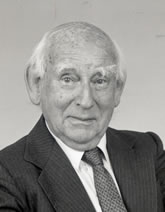Hans Singer
| Hans Singer | |
|---|---|
 |
|
| Born |
29 November 1910 Elberfeld, German Empire |
| Died | 26 February 2006 (aged 95) Brighton, UK |
| Nationality | German-British |
| Field | Development economics |
| School or tradition |
Structuralist economics |
| Influences | John Maynard Keynes |
| Contributions | Singer–Prebisch thesis |
Sir Hans Wolfgang Singer (29 November 1910 – 26 February 2006) was a development economist best known for the Singer–Prebisch thesis, which states that the terms of trade move against producers of primary products. He is one of the primary figures of heterodox economics.
He born in Elberfeld, Germany in 1910. A German Jew, Singer had intended to become a medical doctor before he was inspired to study economics after attending a series of lectures by prominent economists Joseph Schumpeter and Arthur Spiethoff in Bonn. Singer fled the rise of Adolf Hitler in 1933, arriving in the United Kingdom as a refugee.
In 1933, Schumpeter convinced John Maynard Keynes of Cambridge University to accept Singer as one of his first PhD candidates, and Singer received his doctorate in 1936. Under Keynes, he produced two papers in 1937 and 1940 studying unemployment. Keynes also helped secure Singer's speedy release after his former student was interned by the British government at the start of the Second World War. In 1938, Singer applied for British citizenship, listing as references Keynes, William Beveridge, William Temple and the vice-chancellor of Manchester University. His request was granted in 1946.
In 1947, he was one of the first three economists to join the new Economics Department of the United Nations, in which he remained for the next two decades. During his time at the United Nations, Singer was the Director of the Economic Division of the United Nations Industrial Development Organization (UNIDO), Director of the United Nations Research Institute for Social Development (UNRISD), and was closely involved in the creation of the Bretton Woods Framework and the post-World War II international financial institutions.
...
Wikipedia
